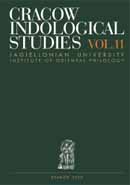Perso-Arabic lexis in the Rāmcaritmānas of Tulsīdās
Perso-Arabic lexis in the Rāmcaritmānas of Tulsīdās
Author(s): Danuta StasikSubject(s): Language and Literature Studies
Published by: KSIĘGARNIA AKADEMICKA Sp. z o.o.
Summary/Abstract: The magnum opus of Tulsīdās, the famous poem Rāmcaritmānas (1574), is undoubtedly one of the best literary and thus also cultural expressions of its time. Its author offered a new telling of the inexhaustible rāmkathā, or the story of Rām, written in the language that the poet himself calls simply bhāÆā (lit. ‘language’) or girā grāmya (lit. ‘rustic speech’). The latter designation does not only complement the author’s modesty, characteristic of the verses putting forward the poem’s pedigree, but also – which seems even more important in this context – draws our attention to the seemingly low status of this language, especially when we compare it with the prestige traditionally ascribed in India to Sanskrit. Indeed, the poet takes the trouble to mention a number of times the fact that his composition is in the language of the people. For the first time he does so as early as in one of the Sanskrit śloka-s opening Book One, which looks like an excuse used by Tulsīdās to adopt the bhāÆā for his telling of the story of the deeds of Rām, his chosen God.
Journal: Cracow Indological Studies
- Issue Year: 2009
- Issue No: 11
- Page Range: 67-86
- Page Count: 20
- Language: English

